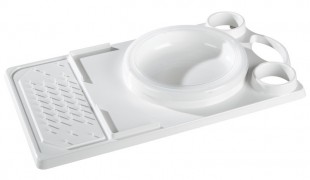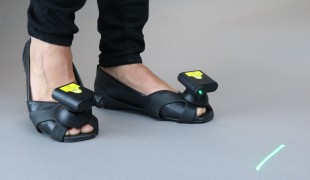- 6408
- 408
- 6
- 5
- 3
- Help Ukraine
About the solution
Ray Finucane, born in the USA, in 1944, is a retired mechanical engineer who struggles with Parkinson’s disease. He built an app, in 2015, to help him better match his medication with the onset of symptoms.
Parkinson’s disease consists of a condition when cells in the midbrain deteriorate and die. These cells produce dopamine, which is imperative for regular muscle movement. To make these dopamine levels normal, the patient takes a drug call levodopa (which is the standard treatment for this condition for more than 50 years).
However, there’s no way to regulate the concentration of dopamine in the patient’s body. So it’s difficult to adjust the perfect dose of levodopa to a specific person and their needs. Also, Parkinson’s disease is a fluctuating condition (symptoms come and go), which makes it harder to predict how patients will respond to the meds.
So Ray faced this as an engineering problem and developed PDWatch, a mobile app (iOS) that would help him calculate and monitor the levodopa dose for his needs.
“What I have done is to come up with a way to predict the cumulative effect of a specified prescription, and a scheme to derive a pill schedule to meet the desired endpoint goal. It involves something akin to unwinding a blockchain if that makes sense to you”, he explained.
Ray had the help of a German developer, Heiko Mueller, and together they created an app that keeps track of the patient’s medication and, based on this, helps the user predict the effectiveness of his drug treatment.
The retired engineer keeps an hourly record of his symptoms on the app, which also serves as a personalised pill tracker. He enters in each and every blue-and-white gelcap of Rytary, the long-acting levodopa/carbidopa he takes, as well as the medication’s dose size and timing. The app can also track the heart rate and step-data data by syncing with the Apple Watch.
PDWatch combines the data with several custom-built algorithms and then shows charts with the estimated levodopa concentration in the brain over time. This information allows the user to get a rough idea about his condition (when he will be able to walk, when he will have to be in bed, etc.).
PDWatch has not been released publicly, as it’s still a prototype. It hasn’t been approved by the FDA but it has been tested and reviewed, informally, by medical professionals.
More info: https://bit.ly/309icdX
Adapted from: https://bit.ly/328aqDa
这些解决方案不应包括使用药物,化学品或生物制品(包括食品);创伤性设备;冒犯性的,商业或内在危险的内容。该解决方案未经医学验证。请谨慎进行!如果您有任何疑问,请咨询健康专家。
DISCLAIMER: This story was written by someone who is not the author of the solution, therefore please be advised that, although it was written with the utmost respect for the innovation and the innovator, there can be some incorrect statements. If you find any errors please contact the patient Innovation team via info@patient-innovation.com
-
-
828
-
2
-
19962

女子发明托盘帮助截肢者自主进食
Cooking
(SELF)-CARE: EATING: Eating independently.
Limb Amputation
Limb Deformity
Assistive Daily Life Device (to help ADL)
Muscle weakness
Limited range of motion
Muscle pain or stiffness
Loss of muscle coordination
Muscle cramps or spasms
Muscle twitching
Restoring mobility
Promoting self-management
General and Family Medicine
Orthopedics
France
-
-
-
852
-
7
-
18744

Path Finder(路径搜寻器) - 一种附着于鞋上的装置,用于缓解帕金森病中的“步态冻结”
WALKING: Walking
BODY BALANCE: Maintaining body balance
STANDING UP: Standing up from a seated position
Parkinson's Disease
Body-Worn solutions (Clothing, accessories, shoes, sensors...)
Assistive Daily Life Device (to help ADL)
Frequent falls
Gait abnormalities (e.g., walking difficulties, unsteady gait)
Loss of balance
Stiffness or rigidity (difficulty moving)
Tremors
Recovering cognitive function
Promoting self-management
Managing Neurological Disorders
Maintaining Balance and Mobility
Neurology
Physical Medicine and Rehabilitation
Denmark
-
-
-
698
-
0
-
17675

Glove to help control tremors
Grip
(SELF)-CARE: EATING: Eating independently.
(SELF)-CARE: DRINKING: Drinking independently.
Parkinson's Disease
Assistive Daily Life Device (to help ADL)
Body-Worn solutions (Clothing, accessories, shoes, sensors...)
Gait abnormalities (e.g., walking difficulties, unsteady gait)
Tremors
Muscle cramps or spasms
Difficulty coordinating movements
Muscle weakness
Cognitive impairment
Restoring mobility
Promoting self-management
Managing Neurological Disorders
Caregiving Support
Neurology
United Kingdom
-
 zh
zh
WesTunrbull20 • Thu, 01/07/2021 - 10:41